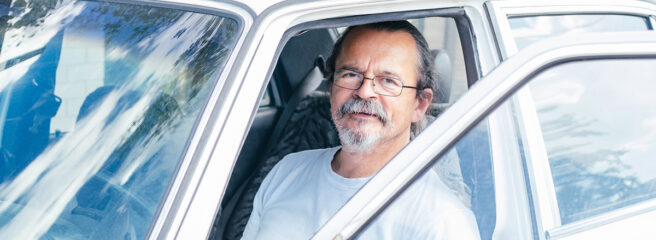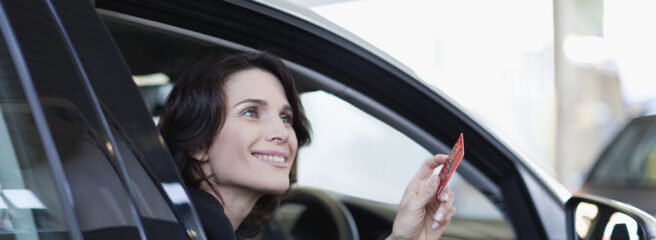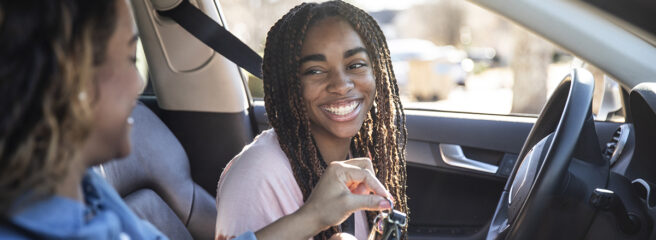
For many drivers, the end of a car lease means upgrading to a new vehicle. But if you’ve fallen in love with your car, you may be dreading the day you hand over the keys.
We’ve got good news for you. Depending on your lease agreement terms, you may have the option to buy out your lease and own your car free and clear.
Sound interesting? This guide breaks down the ins and outs of buying out a car lease. Here, you’ll find information on car lease pricing and what to consider before a lease buyout. We’ll also discuss 4 affordable ways you can pay for a lease buyout and when it makes financial sense to buy out your lease.
What is a lease buyout?
When you buy out a lease, you purchase your leased car from the leasing company. Typically, lending companies will sell a leased car at a fixed price, called the residual value. Also known as a buyout or purchase option price, the residual value is an estimate of your car’s worth at the end of the lease.
Dealerships calculate the residual value by multiplying the Manufacturer’s Suggested Retail Price (MSRP) by the residual value percentage. A leasing company, or another financier, typically sets the residual value percentage instead of the dealership.
Let’s take a look at an example of a $35,000 car with a residual value rate of 45%.
Residual value = MSRP x residual value percentage
Residual value = $35,000 x 45%
Residual value = $15,750
If your leasing agreement includes a buyout option, it will likely outline the residual value determined at the beginning of your lease. Various market conditions could impact the actual value of your car at the end of the lease’s term. Even so, most leasing companies will not negotiate the residual value.
You usually don’t have to pay end-of-lease fees if you buy out the lease. However, other fees may apply, though these vary from company to company.
Lease payoff vs. buyout: What’s the difference?
A lease payoff and buyout are relatively similar, with one major difference. A lease payoff occurs when you buy your car before the end of your lease. Also known as an early lease buyout, a lease payoff is usually more expensive. That’s because you have to pay for both the residual value and the amount you still owe on your lease.
On the other hand, you’ll only pay the residual value—plus fees—when you buy out your lease at the end of the contract.
For example, consider this scenario. You pay $300 per month for your car. Your lending company set your car’s residual value at $14,000. You have 5 months left on your lease, but you’re considering a lease payoff. To calculate the total cost (minus fees), combine the residual value with the amount you still owe on the lease.
Residual value + (monthly payment x remaining installments) = payoff price
$14,000 + ($300 x 5) = payoff price
$14,000 + $1,500 = payoff price
$15,500 = payoff price
You’ll likely have to pay additional fees on an early lease buyout, such as early termination charges. With that in mind, it may be more affordable to wait until the end of your lease to purchase your car.
What to consider before buying out a car lease
It may seem like a no-brainer to buy out your lease. You’ve already made monthly payments for several months or years, right?
In reality, deciding to buy a leased car isn’t so straightforward. Before calling your leasing company, take some time to consider the following factors:
- The car’s condition: It may make sense to buy out your lease if your car’s condition falls into one of two categories—well-maintained or somewhat worn and torn. If you’ve stayed one step ahead of maintenance, you know you’re walking away with a car that’s in good working order.
On the other hand, a lease buyout may also be a good idea if your car has a few dings, dents, or tears in the upholstery. Most leases cover vehicle maintenance to a certain point. But if your car has sustained “excessive” wear and tear, you may get charged more for repairs. Buying out your lease could allow you to avoid these charges.
- The car’s mileage: Most leases come with a strict mileage limit ranging from 10,000 to 15,000 miles per year. Exceeding your mileage limit may result in hefty fees of up to $0.25 per mile. With that in mind, check your speedometer before determining if it’s a good idea to buy out a lease.For instance, if you exceeded your mileage limit by 15,000 miles and have to pay $0.25 per mile, you could get hit with nearly $4,000 in fees. If that’s the case, you could potentially save thousands of dollars by buying out your lease.
- The current market value vs. residual value: It doesn’t always happen, but you may find that your car’s market value is higher than its residual value at the end of the lease. If that’s the case, you could get a great deal by buying out the lease. You could then keep the car or sell it and pocket the profit.
If you find that your car’s market value is less than its residual value, it’s probably a good idea to pass on a buyout. You’ll immediately be upside-down on your car loan. You may also have a hard time financing the car if it’s worth less than the purchase option price.
- The timing: If you’ve fallen in love with your car, you may think it’s a good idea to buy out the lease. Not so fast. An early buyout often comes with extra fees, like early termination charges. You may be able to negotiate with your lending company and get the fees dropped. Still, it’s typically a better idea to wait until the lease ends to buy your car.
- Your personal and financial goals: Finally, consider your personal and financial goals before buying out your lease. Do you have enough cash on hand to pay for the buyout in full, or will you need to finance it? Can you afford to make the monthly payment on a car lease buyout loan? Lastly, are you prepared to handle maintenance costs? If not, it may be a better idea to sign a new lease or shop around for a more affordable vehicle.
So, is buying out a car lease a good idea?
Buying out a lease has its advantages and disadvantages. Ultimately, the decision comes down to factors like your vehicle’s condition, the buyout price, and your financial circumstances.
Still not sure if buying out a lease is right for you? Let’s take a look at some of the pros and cons of a lease buyout.
Pros of lease buyouts |
Cons of lease buyouts |
|
|
How to pay for a car lease buyout
Ready to buy your leased car but not sure how to pay the purchase option price? You’re not alone. Luckily, you have several options to cover the cost of your lease buyout. Consider the following before calling your leasing company and initiating a lease buyout:
- Consider a lease buyout loan. A lease buyout loan is a type of auto loan used to finance your purchase option. In some cases, you may be able to qualify for a financing deal through your leasing company. This could allow you to secure an auto lease buyout loan with a lower APR.
Generally speaking, lease buyout loan rates are usually higher than new car loans, since you’re financing the purchase of a used car. New car loans typically feature lower rates to incentivize buyers. Even so, new cars often come at a premium price and suffer steep depreciation throughout the first year.
With that in mind, it’s essential to shop around for the best rates. It’s also a good idea to review your credit score and credit report before applying. If you’ve got a good to excellent credit score, you could get approved for a loan with a low interest rate. However, if your credit score could use some work, you may need to consider another, more affordable option.
- Apply for a personal loan to buy a leased car. A personal loan is a type of unsecured installment loan you can use to pay your purchase option price. Typically, you’ll receive your funds in a lump sum, making it easy to pay the buyout price. Then, you’ll make monthly payments to your loan provider until you repay the loan.
When you apply for a personal loan, your lending company will review details like your credit score and credit history to set your rate. Most borrowers will need a good or excellent credit score to qualify for an affordable loan.
If you’re in the process of rebuilding your credit, you’re not out of luck. Upstart considers other factors when determining your rates, such as work experience and education. As a result, you may be able to qualify for a more affordable loan to buy out your lease.
- Use cash to buy out a car lease. Using cash to buy out your car lease is the most affordable way to purchase your vehicle. You may have to put down thousands of dollars, but you won’t have to worry about interest rates, loan origination fees, or other costs.
That said, it’s not easy to save up thousands of dollars for a lease buyout. You may also prefer to keep your savings in the bank, where you can access them in the event of an emergency. If that’s the case, a lease buyout loan, personal loan, or another financing option may be the best option for you.
Is it cheaper to buy a leased car?
It may be cheaper to buy a leased car if its residual value is lower than the current market value. Buying out a lease may also be a great deal if you know you’ll face hefty fees at the end of the term, like excess mileage costs.
With that said, take some time to research your vehicle’s value on a third-party site like Edmunds or Kelley Blue Book first. It’s generally easier for the leasing company to sell the vehicle to you than it is for them to make repairs, resell it, or send it to an auction. But you could wind up with an upside-down lease buyout loan if you don’t ensure the purchase option price aligns with the current market value.
A lease buyout loan becomes upside down if your loan balance is more than your vehicle is worth. For instance, if you take out a $15,000 loan to buy a car that’s only worth $11,000, you have an instant, negative equity of $4,000. You don’t have to stay in an upside-down loan forever. An auto refinance loan can help you save money—and potentially help pay off your car faster.
Can you negotiate the buyout price of a leased car?
In short, yes. That doesn’t always mean you will succeed, though. If your lease agreement has a buyout option, it likely has a fixed purchase option price, too. In most cases, your auto lending company may not agree to a lower price. However, if you’ve done your research, you may be able to convince them to lower the cost of the car to keep you as a customer.
If your leasing company won’t budge on the price, you could also negotiate to remove certain fees, such as auto lease buyout fees. Finally, if you’re preapproved for financing from another lender, you may try to negotiate a better rate from your leasing company.
The bottom line: Should I buy my leased car?
At the end of the day, only you can decide if it’s a good idea to buy your leased car. You may like the convenience of a lease. Or you may have dreamed about owning your own car for years.
There’s no right or wrong way to handle a lease buyout, as long as you don’t wind up with an upside-down loan or pay a premium for your leased vehicle. With that said, it might be a good idea to consider buying out a car lease if:
- You like your leased car and are ready to drive a vehicle long-term.
- You don’t want to go through the hassle of buying a new car.
- Your car’s value is in line with its buyout price.
- Your car is in excellent condition or has sustained excess wear-and-tear.
- You’re significantly over or under your mileage limit.
If you decide to move forward with your lease purchase buyout, Upstart may be able to help you find an affordable personal loan to do so. No matter what you choose, make sure you do your research, can afford your payments, and choose a car that will keep you moving forward for years to come.
Car refinance loans not available in IA, MD, NV, or WV.






 Won't affect your credit score¹
Won't affect your credit score¹